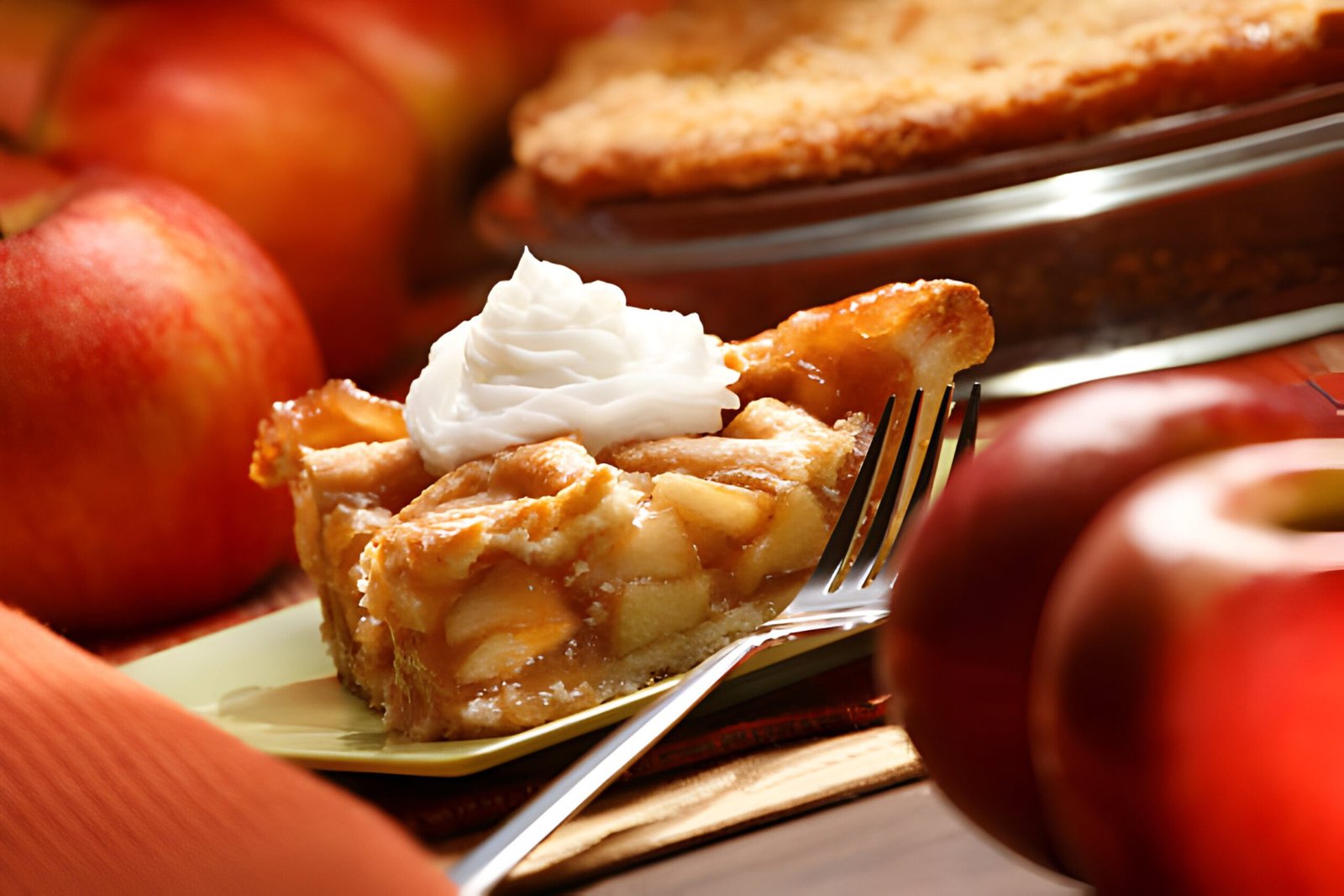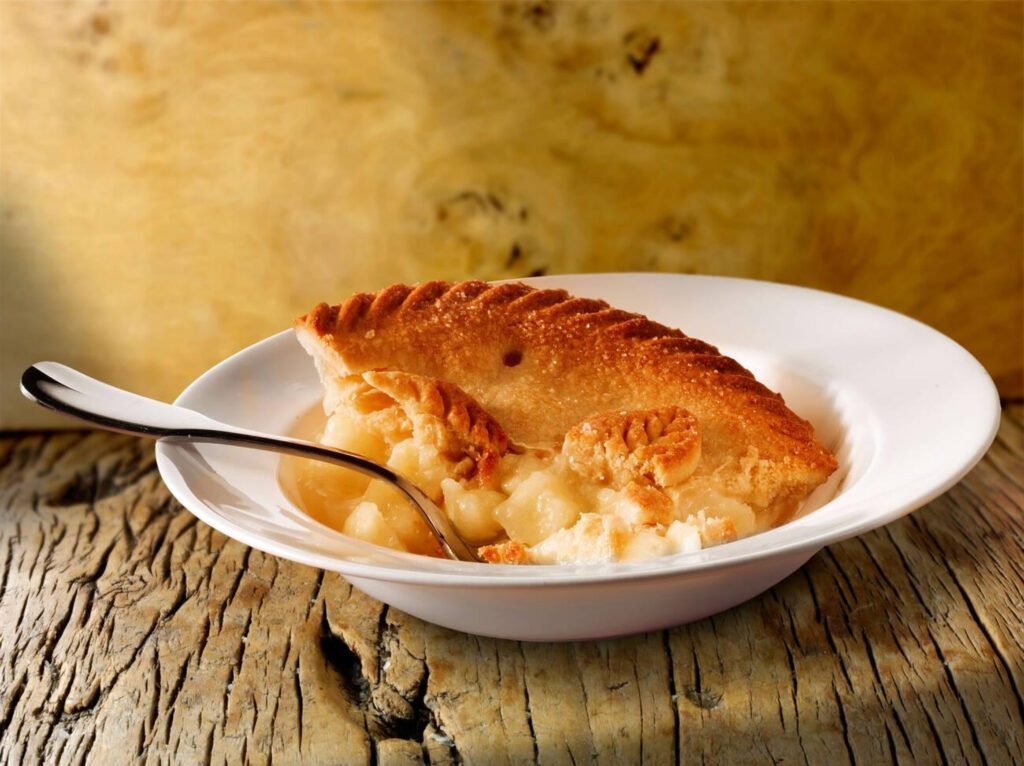Does Apple Pie Need to be Refrigerated

Does Apple Pie Need to be Refrigerated?
Introduction:
Ah, the comforting aroma of freshly baked apple pie wafting through the kitchen—there’s nothing quite like it. But amidst the delightful scent and anticipation of that first heavenly bite, a question lingers: Does apple pie need to be refrigerated? Join me as we delve into this age-old culinary debate and uncover the secrets to keeping your apple pie fresh and delicious.

Understanding Food Safety Guidelines:
Importance of Food Safety:
Ensuring food safety is paramount in any kitchen, whether amateur or professional. Proper storage and handling of food not only preserve its quality but also prevent foodborne illnesses.
Factors Affecting Food Spoilage:
Several factors contribute to food spoilage, including temperature, moisture, pH levels, and microbial contamination. Understanding these factors is crucial for maintaining food freshness.
Refrigeration Guidelines for Perishable Foods:
According to food safety guidelines, perishable foods should be refrigerated at or below 40°F (4°C) to slow down bacterial growth and maintain quality. This includes foods with high moisture content, such as pies with fruit fillings.
Apple Pie Composition:
Ingredients in Apple Pie:
Apple pie typically consists of a flaky pastry crust filled with sliced apples, sugar, spices (such as cinnamon and nutmeg), and sometimes lemon juice or zest. The combination of these ingredients creates a delectable dessert beloved by many.
Role of Moisture in Spoilage:
Moisture plays a critical role in food spoilage, as it provides an ideal environment for microbial growth. In apple pie, moisture from the filling can soften the crust and accelerate spoilage if not properly stored.
Impact of Fillings and Crust on Shelf Life:
The type and amount of filling, as well as the quality of the crust, can affect the shelf life of apple pie. Fruit fillings may release moisture during baking, while a well-sealed crust can help preserve the pie’s freshness.
Shelf Life of Apple Pie:
How Long Does Apple Pie Last at Room Temperature?
At room temperature, freshly baked apple pie can last for about two days. However, its shelf life may vary depending on factors such as temperature, humidity, and exposure to air.
Refrigeration Effects on Apple Pie Freshness:
Refrigerating apple pie can extend its shelf life to up to five days. The cold temperature slows down enzymatic reactions and microbial growth, preserving the pie’s freshness and flavor.
Signs of Spoilage in Apple Pie:
Common signs of spoilage in apple pie include mold growth, off odors, changes in texture (such as sogginess), and visible signs of deterioration in the filling or crust.
Benefits of Refrigerating Apple Pie:
Extended Shelf Life:
Refrigeration extends the shelf life of apple pie, allowing you to enjoy it for several days without compromising quality.
Maintaining Freshness and Flavor:
Chilling apple pie helps retain its freshness and flavor by slowing down enzymatic reactions and inhibiting microbial growth.
Preventing Bacterial Growth:
Refrigeration inhibits the growth of harmful bacteria, reducing the risk of foodborne illnesses associated with perishable foods.
Drawbacks of Refrigerating Apple Pie:
Texture Changes:
Refrigeration can cause changes in the texture of apple pie, particularly the crust, which may become soggy or lose its flakiness.
Moisture Absorption:
The filling of apple pie may absorb excess moisture from refrigeration, leading to a softer texture and potential crust sogginess.
Crust Sogging Issues:
Refrigeration can cause the crust of apple pie to absorb moisture from the filling, resulting in a soggy bottom crust.
Alternative Storage Methods:
Freezing Apple Pie:
For longer-term storage, apple pie can be frozen for up to three months. Wrap the pie tightly in plastic wrap or aluminum foil, then place it in a freezer bag or airtight container.
Room Temperature Storage Tips:
If refrigeration isn’t feasible, store apple pie in a cool, dry place away from direct sunlight. Cover it loosely with foil or plastic wrap to prevent drying out.
Proper Wrapping Techniques:
To maintain freshness, wrap leftover apple pie tightly in plastic wrap or aluminum foil before refrigerating or freezing. This helps prevent moisture loss and protects against freezer burn.
Expert Recommendations:
Insights from Chefs and Bakers:
Many chefs and bakers recommend refrigerating apple pie to extend its shelf life and maintain quality. However, they emphasize the importance of proper storage techniques to prevent texture changes and moisture absorption.
Considerations Based on Ingredients:
The type of ingredients used in apple pie, such as the moisture content of the filling and the fat content of the crust, can influence its shelf life and storage requirements. High-moisture fillings may require refrigeration to prevent spoilage.
Best Practices for Maximizing Apple Pie Shelf Life:
To maximize the shelf life of apple pie, refrigerate it promptly after cooling, store it in an airtight container to prevent moisture loss, and consume it within the recommended storage timeframe.
Personal Preferences and Considerations:
Individual Taste Preferences:
Ultimately, the decision to refrigerate apple pie depends on personal preference. Some individuals may prefer the texture and flavor of chilled pie, while others may enjoy it at room temperature.
Cultural and Regional Influences:
Cultural and regional factors may also influence storage preferences for apple pie. In some cultures, refrigeration may be the norm, while in others, room temperature storage may be preferred.
Factors Influencing Storage Decisions:
Factors such as ambient temperature, humidity levels, and available storage space may influence storage decisions for apple pie. Consider these factors when determining the most suitable storage method.
Conclusion:
Finding the right balance between food safety and personal preference is key when deciding whether to refrigerate apple pie. By understanding the factors influencing food spoilage, the composition of apple pie, and expert recommendations, you can make an informed decision about the best storage method for your apple pie.
My Final Thoughts:
As someone who cherishes the joy of baking and savoring delicious desserts, I understand the importance of preserving the freshness and flavor of homemade treats like apple pie. While refrigeration can certainly extend the shelf life of apple pie and reduce the risk of foodborne illness, it’s essential to consider the potential impact on texture and flavor.
Ultimately, whether you choose to refrigerate your apple pie or store it at room temperature depends on your personal preferences, cultural influences, and storage conditions. Whichever method you choose, be sure to follow proper storage guidelines and consume the pie within the recommended timeframe to ensure the best possible eating experience.
Encouragement to Enjoy Apple Pie Responsibly:
In conclusion, let’s celebrate the timeless tradition of enjoying apple pie with loved ones while also prioritizing food safety and quality. Whether served warm with a scoop of vanilla ice cream or enjoyed cold straight from the fridge, apple pie is a delightful treat that brings joy to any occasion. So, the next time you bake a fresh batch of apple pie, remember to savor each bite and share the love with those around you. Happy baking and happy eating!
With this comprehensive guide, you’re now equipped to make informed decisions about whether or not to refrigerate your apple pie. Enjoy your baking adventures and may your apple pies always turn out deliciously fresh and flavorful!
